Scientists from the Faculty of Pharmacy have developed a molecule that may be used in the treatment of many neurological diseases.
A team led by Professor Krzysztof Kamiński from the Department of Pharmaceutical Chemistry, Faculty of Pharmacy, Jagiellonian University Medical College, has developed a molecule symbolized as iQ-007, which has successfully completed the preclinical phase of development for the treatment of drug-resistant epilepsy. Currently, work is underway on the regulatory aspects of admitting the molecule to the first phase of clinical trials, planned for 2025.
“Our molecule has been identified as a first-in-class, small-molecule, highly selective positive allosteric modulator of the EAAT2 transporter for glutamate. EAAT2, which is expressed primarily in the central nervous system, is the main transporter removing excess glutamate from the synaptic space, thereby reducing the risk of excitotoxic effects of this neurotransmitter,” explains Professor Kamiński. He adds: “In addition to treating epilepsy, the molecule may provide a novel therapeutic approach to many other neurological, neurodegenerative and psychiatric disorders in which glutamate plays a key role, such as Alzheimer’s disease, Parkinson’s disease, Huntington’s disease, multiple sclerosis, amyotrophic lateral sclerosis, ischemic stroke, pain, schizophrenia, depression, anxiety, and addiction.”
iQ-007 has already gained recognition in the eyes of many experts, as evidenced by the gold and silver medals awarded this year at prestigious exhibitions, including the International Exhibition Inventions Geneva and the International Warsaw Invention Show.
In 2020, the molecule was commercialized by the Jagiellonian University through the CITTRU Technology Transfer Center. The license was granted to iQure Pharma, an American biotechnology company. The preclinical phase was carried out by iQure Pharma in cooperation with scientists from the Jagiellonian University Medical College.
Research groups from other national units (Institute of Rural Medicine, Maria Curie-Skłodowska University, Medical University of Warsaw, Medical University of Lublin, Institute of Pharmacology of the Polish Academy of Sciences) as well as leading European (Rheinische Friedrich-Wilhelms-Universität Bonn, University of Oslo) and American (Drexel University College of Medicine, University of Pittsburgh – School of Medicine, University of Utah Health, Harvard University – Harvard Medical School) universities and the National Institute of Neurological Diseases and Stroke (NIH, Bethesda, USA) – The Epilepsy Therapy Screening Program (ETSP) project also participated and are participating in the development of the molecule.
Key experiments confirming, among other things, safety, as well as development work on the preclinical formulation and the drug form for clinical trials, were entirely financed by Venture Funding private capital obtained by iQure from the USA, Germany, and Great Britain.
Poprzednia aktualnośćNastępna aktualność

